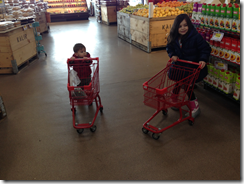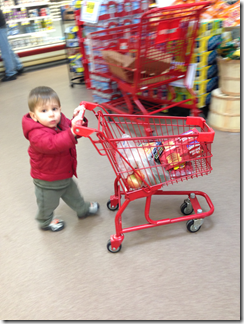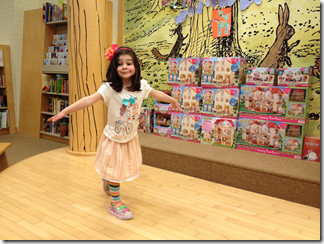Matthew Dicks's Blog, page 403
April 30, 2014
Poetry is not for the faint of heart. At least mine apparently isn’t.
I recently completed a book of poetry and asked some of my faithful first readers to consider offering me their feedback before I pass it onto my agent.
One of my first first readers and one of the earliest supporters of my writing career replied thusly:
I once enjoyed, and even wrote, poetry, but since my soul was destroyed I have lost that connection. I suspect I would not be the best reader for this one.
How could I not love this man?
Quite possibly the cutest moment in my son’s entire life, which would be unfortunate.
My fear is that my son will never be as cute or captivating as he is in this moment.
He may have peaked before the age of two.
That’s a difficult burden to bear. Still in diapers and at his performance pinnacle. I can only hope that this is the beginning of something truly great.
April 29, 2014
We don’t always treat kids fairly when it comes to food and choice
Mark Oppenheimer writes a piece in the New York Times entitled Let Them Drink Chocolate, in which he argues that parents are not fair and just when it comes to our decisions to limit our children’s diet, television consumption and the like.
He writes:
As a parent, I think that it’s time to declare a period of benign neglect when it comes to food. Today, too many Americans make a virtue, even a fetish, of monitoring what goes into our children’s mouths. Rather than raising our children to consume in moderation — whether food, drink, drugs or screen time — we forbid them pleasures that adults take for granted.
We serve them juice boxes rather than soda, fruit rather than ice cream. Yet grown-up dinner parties, which begin with glasses of wine or cocktails, end with rich desserts. Children are deprived of television, or limited to a couple of hours a week, but after the kids are in bed parents catch up on “Game of Thrones.”
I often think the exact same thing.
My wife and I do not monitor everything that goes into our children’s mouths. Because my daughter has a peanut allergy, we are cognizant of what she is eating, but we are not a family hell-bent on only serving organic fruits and vegetables and artisanal breads. We have never kept a written recorded our children’s food intake (which is more common than you might think) and do not stress over high fructose corn syrup.
But when it comes to choice, our children are like most. They eat what we serve, even when we are catering to our daughter’s somewhat limited, vegetarian palate. They may have choices in restaurants, and there are times when my daughter can choose between a yogurt and an applesauce or an apple and a pear, but there are many times when the children have no input whatsoever in the food being served.
As a result, there are days when our daughter (and even our not-quite two year old son) express displeasure in our caloric offerings.
In these moments, I often find myself thinking how exceedingly rare it is for an adult to be required to eat a food that he or she has not specifically chosen.
I may like spaghetti, but if I’m not in the mood for spaghetti on a given day, no one requires me to eat it.
I may love prime rib, but if I happen to want ice cream for dinner, that’s what I eat.
Even though adults understand and accept that there are days when we are not interested in eating even our most favorite foods, we discount a child’s same inclination. We believe, for reasons that perhaps harken back to a time when food was more scarce, that children should eat whatever is placed before them, or at least try it, damn it, even if it smells terrible to them or reminds them of the salamander that they saw earlier that day smeared on the driveway.
We’re not always so nice to kids.
As a kid, I remember feeling this way often. I felt like I didn’t have enough control over my life, which is astounding given the fact that I grew up in a time when I could leave the house on a summer day at 8:00 in the morning and return at 6:00 that evening without encountering a single adult for the entire day.
Still, I had little control over what I ate. Even when it came to school lunch, there was no choice.
And food was just the tip of the iceberg in terms of adult control over my life. Perhaps this feeling of constant adult intervention was the reason I was not always the most well behaved boy and sought ways to rebel.
I’ve never liked to be told what to do. I think most people feel this way.
Kids, too.
I understand that parents must make many choices on their child’s behalf. We use our wisdom and life experience to guide our children in making good choices. We try to teach them to make what we define as good choices. This often means limiting our children’s choices altogether.
All of this is a necessary part of parenting.
But I think it would be wise to try to remember what it was like to be a kid, with little control over your life.
You may not allow your child to suddenly choose ice cream for dinner, but you may be less frustrated and slightly more understanding when your child says that he’s not in the mood for carrots tonight, even though he was thrilled with carrots last week.
As adults, we do the same thing. Why expect any less from our children?
Little people pushing little carriages
Whole Foods was my daughter’s favorite grocery store, which never made me happy since that store annoys the hell out of me.
It’s not my fault. I’m allergic to smugness. It makes me hate everything around me.
Needless to say I was thrilled to learn that my children’s new favorite grocery store is the newly opened Best Market. It’s less expensive, much closer to our home, and decidedly less smug, but these are not the reasons that my children love this store so much.
Can you guess why?
April 28, 2014
My English degree finally pays off.
In 1999 I graduated from Trinity College with a Bachelor’s degree in English. Though I’m quite certain that my years of study have contributed to my success as a teacher and a writer, it’s always been difficult to pinpoint exactly how.
An English degree teaches you to read, write and think, but you could already do this before you arrived at school.
College just improved upon those skills. Hopefully. But as far as identifying the moments in your life when those skills specifically acquired in the college classroom were utilized, it’s been impossible.
Until Saturday night.
Literary Death Match came to Hartford on Saturday night, and after participating as a contestant and losing twice, I served as one of the three judges this time around, along with writer and performer Elna Baker and picture book author Bob Shea.
I was tapped to be the judge of literary merit.
This meant that I had to comment on the work of the four competing writers by comparing and contrasting their work to other famous works of literature and commenting on their literary prowess, while also being kind and amusing.
It was harder than I thought.
Somehow, I managed to make references to Vonnegut, Shakespeare, Saramago, Roth, Updike and Vonnegut’s fictional science fiction writer Kilgore Trout.
I was going to make a reference to Virginia Woolf as well, but I decided to keep my vitriol for this author in check in case there were fans in the audience.
It was the first time in my life that I felt my English degree being put to it’s full use. I felt myself flexing my literary muscles in a way I never have before, and damn it, it felt good.
Four years of intense study and thousands of dollars in student loans finally paid off in this literary game show.
Totally worth it.
April 27, 2014
Look what my wife made!
Technically she made our daughter (with a little help from me), but in this case, I’m referencing the skirt, which she made (along with another) over the the course of day.
As someone who has never made anything with his hands, I am unendingly impressed with my wife’s ability to envision something and then possess the audacity to just make it.
She never ceases to amaze me.
New rule: NO MORE WEATHER TALK
I have a new policy, which I enacted (somewhat awkwardly) for the first time yesterday:
Whenever the topic of conversation turns to the weather, and it doesn’t include a tornado, hurricane, major snow event, or similar weather anomaly, I leave the room if at all possible.
We all have the current weather conditions and the weekly forecast for anywhere in the world on our phones. We have maps with Doppler radar imaging that allow us to track storm systems with the accuracy of a meteorologist.
We don’t need to talk about the weather anymore.
I’d rather converse with a mean-spirited, overly aggressive New York Jets fan than someone who is tedious, and nothing strikes me as more tedious than a needless conversation about the weather.
April 26, 2014
It’s the second parent’s second opinion that is often most valuable
Interesting data out of the UK indicates that that kids who grow up with a single parent or step-parent think of themselves as no less happy than kids who grow up with their biological mom and dad.
Researchers from UK’s NatCen Social Research analyzed data from almost 13,000 children and found that children’s stated happiness had no correlation to their family structure. 36% of 7-year olds said they were “happy all the time” and 64% said they were happy “sometimes or never,” regardless of whether they were raised by two biological parents or one. This result stayed the same even when researchers controlled for social class.
These results surprise me.
Since becoming a parent, I have come to understand the value of a two parent household, regardless of who those parents may be. There are moments in parenting when a second opinion is essential and invaluable.
That second opinion is oftentimes the voice of reason.
When sleep-training our daughter, for example, Elysha and I would would put Clara into her crib and walk away as she began crying. Sitting downstairs, we would listen to her wail through the monitor, and invariably, one of us would crack and decide that we had waited long enough.
The other would then say, “Give it five more minutes.”
Five more minutes was all it ever took for her to fall asleep.
Today she sleeps like a rock and refuses to sleep in our bed, even if we want her to.
I’m not sure that she would be as well trained as she is had only one of us been present during sleep training.
It need not even be a second parent. Any level-headed adult will do. If Elysha was abducted by aliens next week and I found myself alone with my two children, I would immediately move one of my single friends, male or female, into my home to assist with parenting.
Not to change the diapers, make dinner or help with bathing (though that would be nice, too), but simply to serve as the voice of reason when it was needed.
To be available to provide a second opinion.
Also, happiness is not everything. Though children appear equally happy in one or two parent homes, research has also shown that children in single-parent homes are more likely to become incarcerated or drop out of school, so maybe that second opinion is as valuable as I initially thought.
April 25, 2014
Productivity tip #5: Fewer shoes
Limiting choices and increasing the speed at which you make those choices will increase your productivity.
I essentially have two choices when it comes to footwear:
A pair of black sneakers and a pair of black shoes.
When I’m deciding what to wear in the morning, my choice is simple. Unless I’m taking the stage or doing something slightly more formal, it’s almost always the sneakers.
Every three or four months, I replace those sneakers with an identical pair.
In reality, I own more than two pairs of shoes. I also have a pair of golfing shoes and a pair of basketball sneakers, which are kept in my car and only worn for those sports.
I rotate my most recently replaced sneakers into the garage for when I need to mow the lawn or rake leaves.
I have a pair of boots for hiking and a pair of boots for playing in the snow.
I have a pair of tuxedo shoes for times when I am wearing a tuxedo.
But when it comes to everyday footwear, I have two options, and the lack of options saves me time.
I know that most people will discount this minimalist approach to footwear as a marginal time saver at best (because it’s hard to see how seconds a day can add up if you’re not using the recovered time effectively), and many will think that having only two choices of everyday footwear is ridiculous. But before you call me a quack, consider this:
Einstein bought several of the same gray suit and wore one everyday of his life in order to eliminate clothing decisions from his life and free up his mind for more important thinking.
Steve Jobs had more than one hundred back turtlenecks made for him and wore them everyday of his life, for convenience, efficiency, and personal branding.
Barack Obama has only gray and blue suits for similar reasons:
“You need to remove from your life the day-to-day problems that absorb most people for meaningful parts of their day. You’ll see I wear only gray or blue suits. I’m trying to pare down decisions. I don’t want to make decisions about what I’m eating or wearing. Because I have too many other decisions to make.”
Obama also mentioned research that shows the simple act of making decisions degrades one’s ability to make further decisions.
Facebook CEO Marc Zuckerberg recently said that he owns “maybe about 20″ identical grey T-shirts. “I mean, I wear the same thing every day, right? I mean, it’s literally, if you could see my closet at home. It’s just easier that way.”
There are more examples. Many, many more.
I may be a quack, but I’m in damn good company. Productive company, too.
Maybe eliminating shoes is impossible for you. Perhaps the color palette of your feet is too important to abandon this daily decision. But are there other decisions that you could eliminate from your life instead?
I don’t carry an umbrella, wear sunglasses, a watch or jewelry of any kind for similar reasons. I opt for an uncomplicated, streamlined existence. I believe that eliminating these items from my life saves me time and frees my mind.
I own two baseball hats: Patriots and Yankees. I would own just the Yankees cap if I didn’t attend Patriots games so often and perform on stage in Boston on occasion.
Except for days when I was going to spend hours outdoors in the frigid weather, I wear the same coat. hat and gloves. The coat is admittedly only a sweatshirt, but it’s thick and warm, and I tend to be a person who doesn’t get cold easily. My students claim that they have never seen me wear a coat, but that’s because they don’t recognize the warmth of a well made sweatshirt.
Besides, I try to dress for where I am going to be and not the 1-3 minutes that I will spend between my car and that space.
If not the shoes, perhaps you could eliminate some of these choices and layers of accoutrement from your life instead.
When it comes to productivity, less is more. The fewer decisions that you have to make and the fewer items that you need to constantly inventory, the more time you will have and better decisions you will make.
Someone actually ruined bacon.
My five year-old daughter is a self-selected vegetarian, except that she eats bacon. This is understandable, I think. Bacon is good.
My friend, Tony, makes chicken wrapped in bacon for our tailgate parties, but when he runs out of chicken, he finishes off by bacon wrapped in bacon, which is my favorite.
It seemed impossible to ruin bacon, and then someone did this.



















